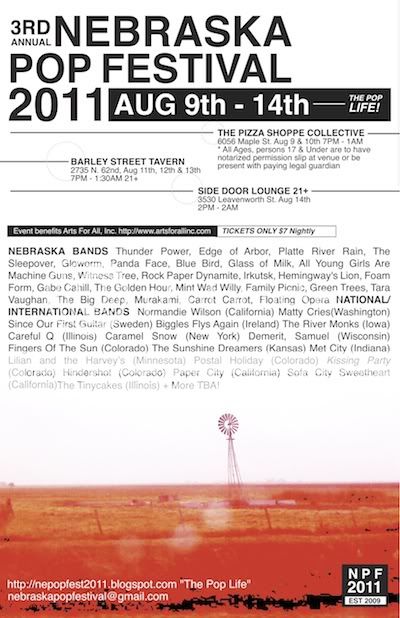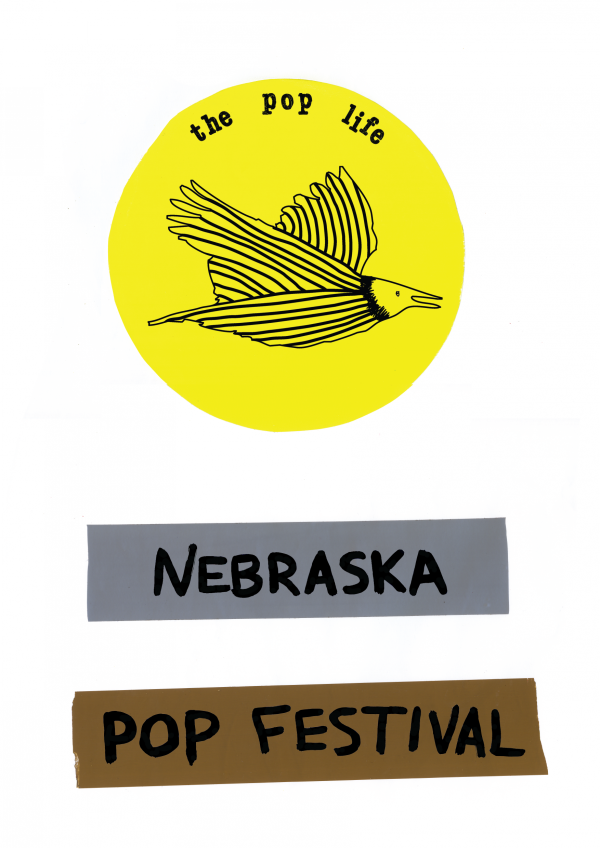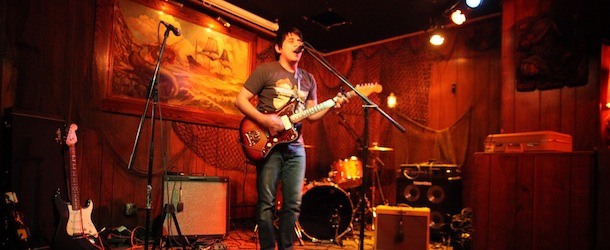Sofa City Sweetheart, above, plays the Nebraska Pop Festival on Aug. 14 at the Side Door Lounge in Omaha.
by Michael Todd
It’s often said small towns offer nothing to do. Christopher Beiermann of Columbus, would tend to disagree.
Using the internet to cobble together a world of musicians, Beiermann was putting the finishing touches on a music festival hosted in Omaha when Hear Nebraska spoke with him. The Nebraska Pop Festival will bring in acts from New Zealand and Sweden, as well as from both coasts of the U.S. Local bands such as Gloworm, Irkutsk and Green Trees will join in, too, at three venues: Barley Street Tavern, The Pizza Shop Collective and the Side Door Lounge. As he says, it’s all a labor of love, just like his bedroom record label, Series Two Records.

All in all, the festival has taken easily more than 1,000 hours of Beiermann’s time, he says, and all money earned from the July 30 pre-festival show to the Aug. 9 through Aug. 14 concerts will go directly to the nonprofit arts education organization Arts for All. It’s a lot of work, but he doesn’t mind as long as it helps Nebraska get to know the rest of the world’s music while appreciating its own "pop music," a term that Beiermann says can be used for wildly varying sounds.
I spoke with Beiermann just after discovering a message he sent to my own music’s email account. I hadn’t received any personal emails before Beiermann’s, so when I read, “Your name has made a very short list of bands to be considered to play at the third-annual Nebraska Pop Festival,” I knew then at least one question to ask him.
Hear Nebraska: Since you basically plucked me out of nowhere, having played no real shows in Lincoln, I’m wondering, how do you discover lesser-known bands?
Christopher Beiermann: I seek them out. And a lot of times bands seek me out, but many more times, I seek them out by doing research online. I listen to what people are listening to. I listen to them in conversation asking them for music recommendations. But the lion’s share of the bands we have coming here were on my shortlist or submitted a CD or sent a handwritten letter or gotten into contact with me via other methods.
HN: How do you pitch the Nebraska Pop Festival to bands outside of Nebraska who might not know what we’re about?
CB: Well, basically, a lot of them are able to take a look at what we’ve done in years pasts, and the bands we’ve brought, where they came from. The convenience factor is a lot of artists and bands from around the world know the term Omaha and Omaha music. A lot of that is thanks to bands like Bright Eyes, Cursive or The Faint.
What I’ve learned about Lincoln is a lot of international bands and bands from the coasts maybe don’t know what Lincoln is. There’s quite a few that do, too, but I know that Omaha is very recognizable as a city. And a lot of them have been here before, but there’s also a lot that have never been here before, and the first time they get a taste of Nebraska is coming to the festival. That happened quite a few times the first year, last year, and it’s going to happen quite a few times this year as well.
Download a mixtape of artists performing at the festival.
HN: Are you still living in Columbus?
CB: Yeah, it’s about 85 miles west of Omaha, basically a straight shot from The Waiting Room, going west.
HN: So do you get to see these bands on the bill very often, or is the festival your chance to get in touch with them?
CB: A lot of the artists and bands from Lincoln and Omaha I’ve either already seen or made an effort to see prior to their performance at the festival. There’s a fair amount of artists and bands coming back from out of state.
I honestly do my best to see these bands, and any time they do come to Omaha or Lincoln, I can’t always make it because it entails a three-hour roundtrip for me. I think it’s worth it, but it does involve getting home. When shows end at one or 1:30, you get home about 3 or 3:30. I remember one time going to a show at the Clawfoot House in Lincoln. I got home at 4 a.m. because I talked with one of the people who run the house.

HN: Tell me about your own record label (Series Two) and how it intersects with the festival.
CB: Well, my record label started about five years ago. Technically, the LLC was established Feb. 21 of 2006. The five-year anniversary came this year.
It’s been a very big labor of love, never been about money for me, just about helping out artists and bands, generally a lot of lesser-known artists and bands who are making some really good music that didn’t reach too far out of their own scene and their own region. I wanted to make sure other people could hear it.
Series Two was integral to making the festival happen in 2009. Back then, quite a few bands I had worked with on the label expressed interest in coming from as far away as Germany, Denmark, the UK and Indonesia. And I was glad I got an outpouring of support the first time I did the festival.
I’d like to say many of the artists and bands that have played the festival had done a compilation or I’d done a release for. This year is it’s less than there was in the beginning, and a lot of that has to do with most of the artists I have worked with are from Europe and Asia and traveling costs are quite expensive.
Series Two is a project that would say is kind of on the back-burner as I’m doing the pop festival. But I’m going to move it to the front-burner soon.
HN: What do you do as a day job, and how does the festival influence what you do?
CB: Currently, I’m actually seeking employment. My last position, though, was in human services. And that line of work entails a lot of caring, a lot of time and a lot of patience. But I enjoyed doing it because I like helping others, and that’s one of the reasons why I do the Nebraska Pop Festival. I think it helps people establish a relationship with the bands, whether they’re in a band themselves or they’re just a music lover.
HN: OK, and you always donate the proceeds from the festival. Why did you choose Arts for All for this year?
CB: It wasn’t an easy decision because I had been in touch with other beneficiaries. But it just wasn't materializing. Then I talked with Andrew McGreevy over at The Pizza Shop Collective in Omaha, asked him about suggestions, and he was very prompt in letting me know that he thought Arts for All would be a good beneficiary. And I did not hesitate in contacting the director at Arts for All and she started talking to me about the organization and seemed excited about what I was doing. And from there, history was made, and I couldn’t be more proud.
They’re helping out now, too, doing a little promotion work, and every bit helps. The main thing about the promotion is I want them to be spotlighted. They’re helping a lot of kids who are underprivileged. They also provide programming to other children that maybe aren’t as needy, but people that still like the arts. I think the programming is very good quality, and I’ve heard nothing but good things about them. There’s several artists and bands playing this year that were quite happy with the announcement of them being added as a beneficiary.





